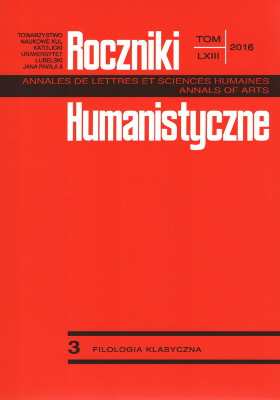Listy Marka Celiusza Rufusa o „zemście doskonałej” (Cic. Fam. 8, 12-17)
Letters of Marcus Caelius Rufus about ‘the perfect revenge’ (Cic. Fam. 8, 12-17)
Author(s): Agnieszka DziubaSubject(s): History, Language and Literature Studies, Studies of Literature, Ancient World, Other Language Literature, Philology
Published by: Towarzystwo Naukowe KUL & Katolicki Uniwersytet Lubelski Jana Pawła II
Keywords: Marcus Caelius Rufus; Marcus Tullius Cicero; Appius Claudius Pulcher; Rome; republic; letters; revenge; politics; lawsuit
Summary/Abstract: Epistulae ad Familiares contains not only letters written by the great orator to his friends and familiars but also received correspondence. There are seventeen letters written by Marcus Caelius Rufus – the pupil and friend of Cicero – in sixteen books of epistulae. Caelius was writing his letters in the period of three years from 51 till 48 BC when Cicero was, among others, a governor in Cilicia, in Asia. The pupil and active politician was giving information to his older colleague about Roman politics and an activity of society. Caelius did not hesitate to relate to ordinary gossips.This paper concentrates on one of the subjects mentioned in Caelius’ letters – his problems with hostility of Appius Claudius Pulcher, the well-known Roman politician. Publius Cornelius Dolabella, future Cicero’s son-in-law, accused Appius of vis. Caelius, who wanted to borrow money from Appius, tried to involve Cicero in Claudius’ defense. The young politician thought that Appius would give him money in token of gratitude. It appeared soon that Caelius did not only receive loan, but also enabled Appius to get a revenge against him. The patrician hated Cicero’s pupil for his prior activity (a discredit of Clodia Metelli, the sister of Appius, an advancement of Titus Annius Milo – the murderer od Appius’ brother – Publius Clodius and a detriment of Lucius Domitius Ahenobarbus – the friend of Appius). Te patrician accused Caelius of immoral behaviour. The Cicero’s pupil avoided accusation only because he was an aedile in this time. In the next year, Caelius, as a private man, had to look for protection in Caius Iulius Caesar camp. Caesar was an enemy of optimates, a party of Appius, Cicero and until quite lately – Caelius. This decision of young politician showed his opportunism and conformity and lead to his death in the next year.
Journal: Roczniki Humanistyczne
- Issue Year: 64/2016
- Issue No: 3
- Page Range: 111-122
- Page Count: 12
- Language: Polish

